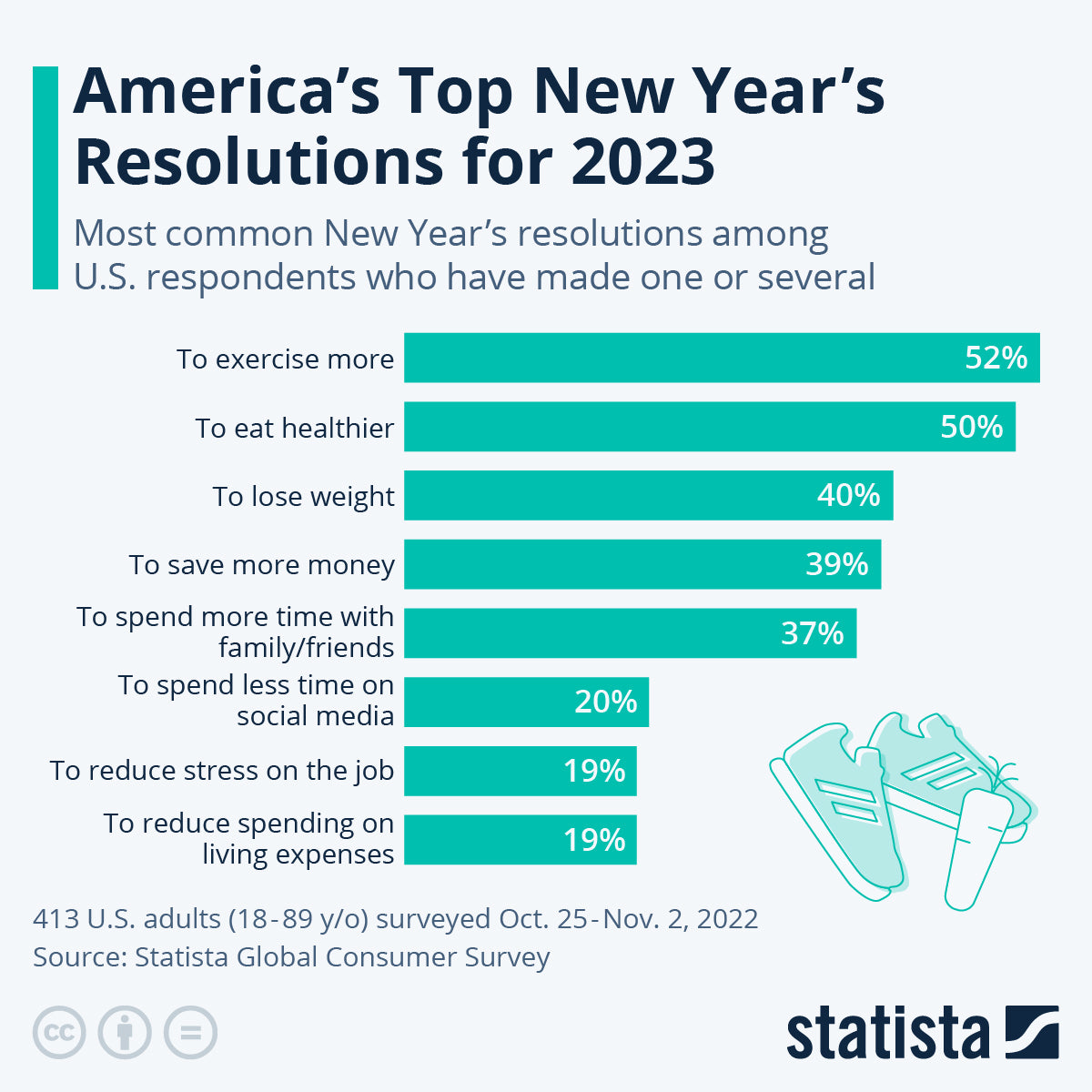What’s the secret to creating a sustainable New Year’s resolution?
Research shows that only 9% of people who make resolutions actually stick to them [*]. There’s even an average day when most people abandon their goals: January 19 — “Quitter’s Day.”
Unfortunately, starting each year with ambitious expectations is not enough to become the best version of yourself. You need a strategy that sets you up for success, complete with backup plans, a support system, and more.
So let’s kick off the New Year right and learn how to achieve everything you want in the next 12 months.
How To Create Sustainable New Year’s Resolutions for 2023
Stats tell us the most common New Year’s resolutions for 2023 are to exercise more (52%), eat healthier (50%), and lose weight (40%) [*].

Now, those are no easy feats to accomplish without a game plan. That’s why a better strategy is to:
1. Set Realistic “Approach Goals”
Three key factors influence successful goal-setting:
Realistic vs. unrealistic expectations. Unrealistic goals set you up for failure. And when you inevitably fail, you feel miserable about yourself and struggle to maintain motivation.
Most of us can’t lose 30 pounds in a month (unrealistic). But we can aim to lose one or two pounds in a week (realistic).
Approach vs. avoidance goals. Science says approach goals help you move toward a desired outcome, whereas avoidance goals focus on moving away from an undesired one [*].
So a positively-framed approach goal might be “I’m going to eat clean protein bars for my afternoon snacks.” A negatively-framed avoidance goal might be “I’m not going to eat junk food.”
Though they may appear similar (making clean eating a priority), approach goals are associated with greater psychological well-being and a higher likelihood of success [*]. Avoidance goals? Just the opposite.
Intention. Why do you want to create your new resolution? If you don’t fully believe in your goal, you won’t have the internal fire to push through when the going gets tough. So think about what really motivates you to make positive changes in your life and let it guide you.
2. Outline a SMART Plan
SMART goals are Specific, Measurable, Achievable, Realistic, and Time-Based. They concentrate on reaching one particular outcome rather than overhauling your entire life.
Resolutions often fail because people don’t enact the right strategies. So when you create a SMART plan, you simply outline how you’ll reach your SMART goal.
Let’s say you want to lose weight. A SMART goal would look like this: I want to lose 5 pounds every month.
That’s specific, measurable, realistic, and time-bound.
But to achieve it, your SMART plan might include mini-goals such as:
- I will drink at least 64 ounces of water daily
- I will fill half my plate with veggies each meal
- I will exercise at least 30 minutes 5x a week
Keep your tasks simple to increase your chances of actually doing them.
Always write down your resolution and mini-goals. According to research, we’re 42% more likely to achieve our goals when we write them down [*]. So pop a few sticky notes where you’re most likely to see them (like on your fridge, bathroom mirror, as a reminder on your phone, etc.) to keep these goals visible.
Track your progress with a notebook or spreadsheet to maintain momentum after you kickstart your fitness routine or clean eating habits.
3. Build In Backup Plans

Some experts say a Plan B is even more important than a Plan A. These backup plans add flexibility to your goals and prevent an “all or nothing” mentality.
After all, adopting new habits and making lifestyle changes takes a lot of time, dedication, and hard work. But we’re only human. We can’t expect perfection when life gets in the way of our best-laid plans and intentions.
So try to identify potential roadblocks that may derail your progress and come up with workarounds to stay the course.
For example, will you give up your clean eating goals when you have a social event to attend?
What happens when you’re not motivated to work out?
And if you usually exercise outside, do you know how to stay warm during outdoor winter workouts?
Backup plans help you stay the course, so one mistake or bad day doesn’t sabotage the rest of the year.
4. Find or Be Your Own Support System
A lack of support can tank our best efforts and lead us back to old habits.
Find your people. Try to surround yourself with people who support your goals and offer encouraging accountability.
Join a neighborhood walking club if you want to hit 10k steps a day, or sign up for local 5ks to meet fellow runners. Take a group fitness class. Or swap healthy recipes with online friends on the same mission.
Working together with like-minded people makes it easy to stick to your resolutions because they won’t derail you or say “I told you so” if you mess up.
Be your own cheerleader. Write out a few affirmations about how awesome you are, and read them whenever you feel unmotivated.
Consider health-positive affirmations like:
- Exercise makes me feel powerful and happy
- I am getting stronger and healthier each day
- I am proud of my healthy eating choices
- I deserve to be the best version of myself
- I am unstoppable
Repeating these daily mantras makes you more likely to believe in yourself, push forward, and silence the doubting voices around you (or in your head).
5. Reward Yourself for Milestones and Small Wins

Our brains are hardwired to respond to rewards. By making a task more appealing (or enjoying something special after accomplishing one), your brain becomes more motivated to keep doing that activity.
So let’s say you want to get more sleep in 2023.
You can create a bedtime routine that makes you look forward to winding down. Save your special self-care products for night-time use only. Read a book you’re excited about only before bed. Invest in luxurious PJs or bedding to beckon you away from the TV.
Similarly, reward yourself after you reach any of your mini-goals. Stay away from food-based rewards like cheat days. Instead, treat yourself to new workout gear, a meditation app, a massage, etc.
Rewards can also be well-deserved breaks. A day off will help you recharge so you don’t abandon your goals out of exhaustion. Aim to be more mindful, find activities that decrease stress, and learn how to take better care of your mental health this year.
So What’s Your Sustainable New Year’s Resolution?
You now know how to create sustainable New Year’s resolutions, strategize a winning game plan, and stick to your health and wellness goals despite life’s ups and downs.
Congratulations on taking the first step today! Now come up with your SMART goal and keep the ball rolling. Remember, big changes don’t happen overnight. But you got this!
Psst! Check out this blog on how to get organized for the New Year next!
Author: Devan Ciccarelli
Email: devan@behappynothangry.com
Instagram/Facebook Group: @behappynothangry/Be Happy Not Hangry
Website: www.behappynothangry.com




